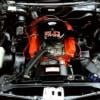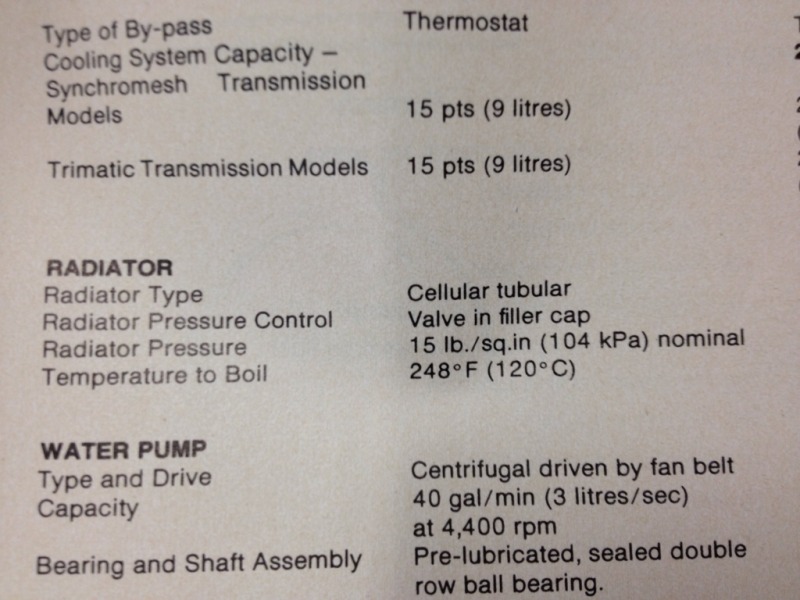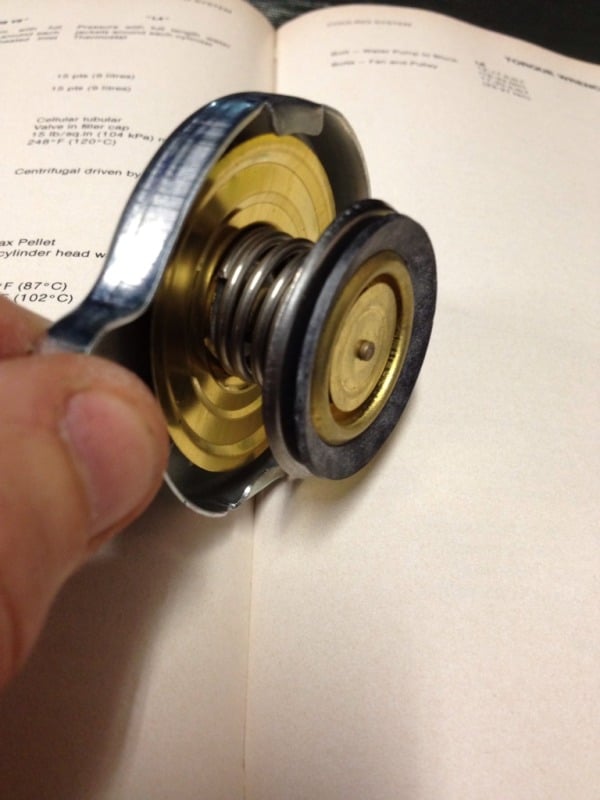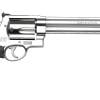
Radiator cap
#1

Posted 06 October 2012 - 05:07 PM
#2

Posted 06 October 2012 - 06:34 PM
Google it you'll know what I mean
Higher pressure means the engine can run at a hotter temp if required
Though many engines don't like this
Caddy runs hot... thats the way they like it
Dattos run cool
Toranas don't run so can't remember that one... lol
#3

Posted 06 October 2012 - 07:01 PM
So 15psi is correct.

This is the 15psi cap I bought....

Can't really find any good info on the net on the differences. Maybe I'm not looking hard enough.
Edited by hanra, 06 October 2012 - 07:03 PM.
#5

Posted 06 October 2012 - 09:27 PM
#6

Posted 06 October 2012 - 10:25 PM
Coolant recovery caps run 2 seals
One on the cap underside and one on the jigger
#7

Posted 06 October 2012 - 11:00 PM
#8

Posted 06 October 2012 - 11:13 PM
Well looking at mine. It's only got a seal on the jigger so I'm guessing it's correct for a non recovery system.
Correct Brad.
#9

Posted 07 October 2012 - 07:54 AM
extra heat generated which allowed the coolant temp to run slightly higher before it vented.
#10

Posted 07 October 2012 - 08:04 AM
#11
 _torbirdie_
_torbirdie_
Posted 07 October 2012 - 02:56 PM
If you add 25% glycol, http://www.engineeri...ycol-d_146.html, you will achieve the same margin.
It would cost about the same as adding corrosion inhibitor which you'd be doing anyway?
Running lower pressures increasing cooling component lifetimes.....hoses, heater cores, radiators, head gaskets etc.
You are subjecting the entire system to this pressure every time you drive it even though you perhaps only need the protection it affords once in the car's lifetime.
personally I'd run more glycol and go 7-9 psi and could even use lower for winter.
Edited by torbirdie, 07 October 2012 - 03:05 PM.
#12

Posted 07 October 2012 - 06:08 PM
#13
 _torbirdie_
_torbirdie_
Posted 07 October 2012 - 08:56 PM
Running higher pressure increases the cooling effect of the coolant.
Myth
#14

Posted 07 October 2012 - 09:02 PM
Myth
Whatever.
#15

Posted 08 October 2012 - 07:09 AM
#16
 _torbirdie_
_torbirdie_
Posted 08 October 2012 - 12:07 PM
I guess it depends on your interpretation - as stated above a higher pressure increases the boiling point, above which coolant is useless (because its in gaseous form) and below which it is generally still having some effect. So with a higher boiling point it is effective for longer, I suppose you'd call that an increase in effectiveness. The pressure makes no difference to the effectiveness of the coolant as long as its not boiling though.
Given that the virtues of how increasing the pressure effects boiling pt had already been clearly discussed and stated the only inference that could be drawn form an additional statement that higher pressures increase the "cooling effect of the coolant" is that it infers that somehow the higher pressure squeezes more heat out of the substance. how the heat is conducted away from the radiator tubes and the amount of turbulence necessary to mix the fluid to create max heat transfer is a science in itself of which the pressure inside the system plays a part and for any design there will be an optimum pressure to match the rate of coolant flow required,
More pressure does = more heat transfer via thermal conductance, but for water the increase is only 0.0004% per 1 psi, which basically = no measurable effect at the pressures we can put inside a car system,
#17

Posted 08 October 2012 - 12:55 PM
#18

Posted 08 October 2012 - 12:58 PM
#19
 _torbirdie_
_torbirdie_
Posted 08 October 2012 - 01:22 PM
Yeah Im just following what the Workshop manual says, was considering dropping to 13psi.
The writers of the manual didn't have in mind that in 40 years time that higher boiling point coolants /glycol mixes would be more available and cheaper.
Where it is all possibly heawding in the future:
http://www.ls1.com.au/forum/showthread.php?69818-Mainlube-s-new-190C-Boiling-Point-Total-Full-Coolant
http://www.evanscooling.com/
Anyways the decision is yours, radiator repairers,mechanics /hose suppliers etc will love you for running at higher pressures.
#20

Posted 08 October 2012 - 01:30 PM
Can't see how radiators or hoses would be significantly affected by an increase to say 21psi, but don't think I'd like to ask any more of some of the old beaten up heater cores.
#21

Posted 08 October 2012 - 01:39 PM
If it burps coolant the system is compromised .
Most people think a car overheats and looses coolant, it is the other way around, the system looses pressure (coolant) and the coolant boils. once it boils it can no longer act as a coolant.
Run the 15psi cap in every instance you can, if anything it will act as a safety margin.
#22

Posted 08 October 2012 - 03:13 PM
#23

Posted 08 October 2012 - 03:22 PM
Edited by TerrA LX, 08 October 2012 - 03:25 PM.
#24

Posted 08 October 2012 - 03:28 PM
When the cooling system is in good condition and operating correctly, the only loss of coolant is that purged via the radiator cap to maintain correct pressure. This loss of coolant only brings it back to down 15psi (or whatever the operating pressure) and does not contribute to overheating.the system looses pressure (coolant) and the coolant boils
Obviously there is a bit of a margin but in general if the cap is 15psi the coolant must first boil at 15psi (120 degrees or whatever that equates to) before excessive coolant is purged due to the much larger expansion of the coolant in gas form. There is no way that a normal coolant purge should cause a boil, it is common place for the cap to open during normal operation (it should do it every time the engine warms up in a recovery type system where the radiator refills itself every time the coolant temp drops).
#25

Posted 08 October 2012 - 03:52 PM
The purge you refer to is due to expansion of the heated coolant, I was strictly speaking in terms of an overheat situation, IF you have a recovery system there is allowance for expansion under normal running conditions, it is not something you want happening if there is no recovery system.You might need to, I'm not sure what you're trying to say but it comes across as backwards...?
When the cooling system is in good condition and operating correctly, the only loss of coolant is that purged via the radiator cap to maintain correct pressure.
I hope that clears it up for you.
1 user(s) are reading this topic
0 members, 1 guests, 0 anonymous users









 View Garage
View Garage








